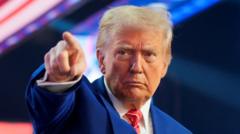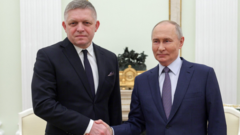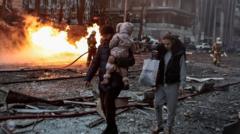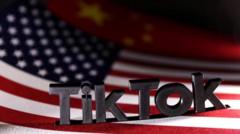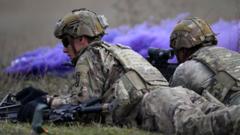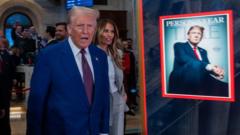As Calin Georgescu leads Romania's presidential race, recent statements indicate he may end military and political support for Ukraine, prioritizing national interests. Facing Arabella Lasconi in a run-off, Georgescu's controversial campaign has sparked debate on foreign influence and Romania's role in EU solidarity.
**Calin Georgescu's Presidential Bid: A Shift in Romania’s Foreign Policy Stance?**
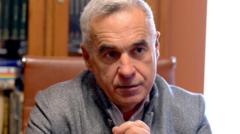
**Calin Georgescu's Presidential Bid: A Shift in Romania’s Foreign Policy Stance?**
Calin Georgescu's campaign signals potential changes in Romania's support for Ukraine amid rising tensions and allegations of foreign influence.
Calin Georgescu, a fringe nationalist leading Romania's presidential race, has made headlines with his vow to cease support for Ukraine if elected. In a recent interview with the BBC, Georgescu emphasized placing "the Romanian people" first, rejecting claims that his campaign is influenced by Russian operatives. Despite facing scrutiny from Romania’s intelligence agencies, he asserts his surprising electoral success is rooted in the people's desire for more autonomy.
His campaign has utilized social media extensively, prompting fears of a "highly organized" Russian influence operation. The Romanian government released declassified documents alleging that millions of dollars were spent promoting campaign content on TikTok, which raised alarm among officials. As prosecutors launched a criminal investigation, requests to examine these alleged meddling efforts flooded the constitutional court.
Georgescu dismissed these concerns as indicative of fear from the establishment, asserting that the Romanian populace is reclaiming its dignity and control. His stance has garnered attention for both praising leaders such as Donald Trump and Viktor Orban and referring to Vladimir Putin as "a patriot and a leader," although he quickly clarified that he does not align himself with Russia.
On the critical issue of Ukraine, Georgescu displayed ambivalence, initially questioning the existence of the war before expressing his commitment to prioritizing Romania's interests. He categorically stated, "Zero. Everything stops," regarding military or political support for Ukraine, advocating instead for peace negotiations without conditioning them on Kyiv's terms.
This potential pivot in Romania's foreign policy could align the nation with Hungary and Slovakia in a more Russia-sympathetic stance within NATO. Romania has a longstanding partnership with Ukraine, providing military aid and acting as an essential transit route for Ukrainian grain. Georgescu's proposed changes could undermine EU solidarity amid the unfolding dynamics surrounding Ukraine.
Although he asserts Romania will remain in the EU and NATO, Georgescu is clear that future engagements would focus solely on Romania's interests. Concerns are growing among citizens about the implications of his policies on national security and regional stability, prompting protests in Bucharest advocating for sustained European alliances.
As the landmark election approaches, Georgescu's rhetoric may reveal a deepening divide within Romania about its place in international affairs, reflecting a broader conversation about nationalist sentiments versus global responsibilities. The outcome could redefine Romania’s role on the eastern flank of NATO and its response to the ongoing crisis in Ukraine.

